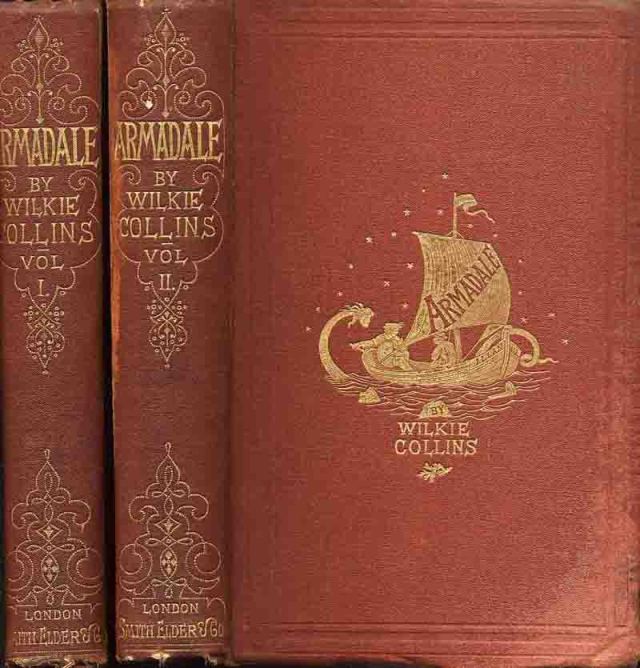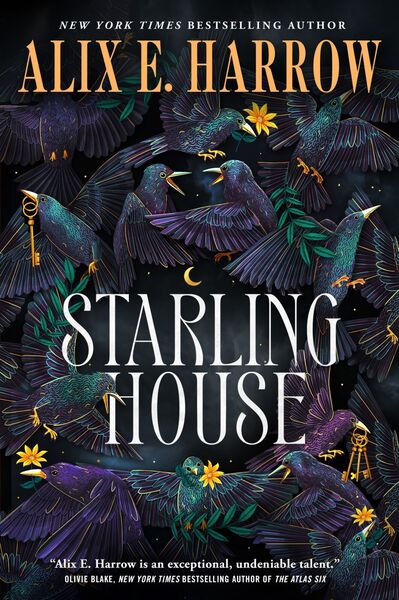Between Men: Wilkie Collins’s Armadale
Between Men: Wilkie Collins’s Armadale

I appear to be on a Wilkie Collins tear this summer. With The Woman in White and The Moonstone well behind me and having finished The Dead Secret earlier this summer and found it interesting but uneven, I decdied to give Armadale a try. I have just finished it, and I can say that this is the most insane plot I have yet encountered in a Wilkie Collins novel–and that’s saying something. But I tore through it anyway, partly because the point of the plot is really just to find out the answer to the novel’s two central questions. The first, and the one that will be most heavily emphasized by the many entities out there trying to sell you summaries of this novel, is: does Fate exist? In other words, is there an external force out there that really determines our destinies, or is all the evidence that we think we see of Fate at work in the world actually the result of a human desire to believe in such a force? The second, and the one that I personally found more compelling, is: can the devotion of two young men to each other survive against all odds, despite all the material, social, psychological, sexual, and possibly metaphysical forces seeking to destroy it?
I will try to avoid major spoilers in the discussion behind this cut tag, but it will be impossible to avoid some spoilers. The short story is that I’m telling everyone to read this novel. It is unlike anything else you will have ever read; it features one of the most deservedly notorious villainesses in all of Victorian fiction; and it also has a lot to offer the reader who is neurodivergent, anxious, or both–or the reader whose loved ones fit any of those categories.
So, when I say this plot is insane…
This novel is obsessed with doubles, thematically and structurally. Most Victorian authors contented themselves with maybe one pair of dopplegangers. Please don’t be put off when I tell you that there are five characters in this novel named Allan Armadale. It’s OK because for most of the novel, three of them are dead.
Here’s how Collins gets us to five Allan Armadales:
- The first Allan Armadale–not the first one we encounter, but the ancestor, the ur-Armadale–is a hugely wealthy plantation owner in the West Indies. He has, as is still fairly common, named his oldest son after himself. I will call him Allan Armadale Junior.
- Alas, Allan Armadale Junior is a feckless ne'er-do-well wastrel type who disappears into a maelstrom of scandal and depravity. Allan Armadale senior, having booted Junior out of the estate, decides he wants to leave his fortune to a relative also living in the West Indies. The only condition is that this relative has to take the name Allan Armadale. So he does, bringing the total number of Allan Armadales to 3. I will call him New Allan Armadale.
- Soon after he inherits, New Allan Armadale makes the acquaintance of a guy going by the name of Fergus. Fergus has a bad rep but New Allan Armadale doesn’t care; he becomes besties with Fergus. At one point, New Allan Armadale confides to Fergus that he’s been invited by the rich Mr. Blanchard, also a distant relation, to visit him at Madeira and (assuming they hit it off) marry Mr. Blanchard’s beautiful daughter. Fergus then poisons New Allan Armadale, sails to Madeira himself while NAA is recovering, presents himself to Mr. Blanchard as New Allan Armadale, and seduces the beautiful Blanchard daughter. With the help of a young lady’s maid named Lydia Gwilt (as they used to say in the Hannibal fandom: it fucken rhymes) they forge enough letters and other documents to convince Mr. Blanchard that “Fergus” is in fact New Allan Armadale, and they get married. The irony (first of many) here is–of course!–that “Fergus” is actually Allan Armadale Junior, come to steal all the stuff of the man who supplanted him in the first place. So when New Allan Armadale shows up and is told that Miss Blanchard has already been married to Allan Armadale…well she is in fact married to AN Allan Armadale, just not THE Allan Armadale, i.e. the one her father wanted her to marry.
- Allan Armadale Junior and his ‘stolen’ bride run away. The disappointed New Allan Armadale marries a biracial woman who loves him but about who he cares very little. Each of them has a son. Each of the sons is named Allan Armadale. This brings us to our full complement of five Allan Armadales.
As I said, three of them are dead for most of the novel. That’s because, after Allan Armadale senior dies and all these post-inheritance shenanigans take place, New Allan Armadale hunts Allan Armadale Junior down and kills him. The novel begins with New Allan Armadale, now a dying man, dictating his confession of the murder, in hopes of protecting his son from whatever karma might be coming for him. Convinced that the Armadale name is doomed and that the two Armadale sons are, like their fathers, destined to Destroy Each Other, New Allan Armadale’s dying letter to his son closes with a dire and doom-laden warning to NEVER UNDER ANY CIRCUMSTANCES COME INTO CONTACT WITH THE OTHER ALLAN ARMADALE.
That’s the prologue. Guess what happens after the time jump.
That’s right! Just about the time he’s becoming a Young Grown-Up, Allan Armadale Junior’s son (let’s call him Allan Armadale III) befriends a lost, hungry, sick and distressed boy about his own age who’s going by the handle of Ozias Midwinter. His mother doesn’t like this; but Allan and Ozias are soon so devoted to each other that nothing can separate them–except maybe Ozias’s knowledge that his own father, who is of course New Allan Armadale, murdered Allan Armadale III’s father and then gave him that WARNING FROM FATE. For the rest of the novel, “Ozias Midwinter”–his real name is of course Allan Armadale but he doesn’t use it–struggles with his fear that he is fated to bring destruction to the man he loves, viz., Alan Armadale III.
OK. By the way. You all know I see slash people. But there is a very heartfelt conversation early on between “Ozias Midwinter” and the clergyman who is standing in loco parentis for the orphaned Allan Armadale III in which “Ozias Midwinter” straight up says, verbatim, “I love him.” And the clergyman is like, I know, and good for you. Will each of them fall in love with a woman (or maybe more than one) before this novel is over? Sure. All the same, Midwinter’s love for his namesake is not just friendship or fellowship or comradely love. For him, Allan Armadale III is The One. As for Allan Armadale III–well, he feels the same, only his personality is really different.
See, Alan Armadale III isn’t worried at all about whether he and Midwinter are Fated To Destroy Each Other, for two reasons. One: because his mother told him nothing about her scandalous past, Allan Armadale III doesn’t know what his father did to “Ozias Midwinter’s” father OR that “Ozias Midwinter’s” father murdered his own father. Two: Allan Armadale III is one of the happiest upper class twits ever to grace the pages of a Victorian novel. Allan Armadale III trusts people immediately, assumes that everyone around him is as transparent as he is, fails to pick up on subtext in any form, takes everything said to him at face value, never appreciates the importance of observing social rituals, falls in love with every beautiful woman he sees, and just in general fails when it comes to any kind of self-preservation.
And this is where the neurodivergence thing comes in. I am in general very reluctant to apply modern psychological terminology to pre-Freud fictional characters. Nevertheless, it is undeniable that Allan Armadale III sports a collection of traits that in our age would be more than enough to earn him an ADHD diagnosis. Having failed to interest Allan Armadale III in most of the standard subjects, the clergyman in charge of his schooling eventually decides that the only thing for it is to let Allan Armadale work at the one thing he’s interested in, which is building and sailing boats. The fact that Allan Armadale III can’t narrate anything without going off on tangents, is continually distracted, and is notoriously terrible at explanations, is emphasized throughout the novel and sometimes becomes important to the plot. (He’s great at writing letters, though–because he does it impulsively, without thinking at all about the possible consequences of what he’s saying.) All of this is endlessly charming to Midwinter, and it also endears him to the readers–which is important, because this novel really depends on the readers desperately wanting Allan Armadale III to be OK.
So whereas most sensation fiction relies for audience engagement on escalating endangerment of the heroine, this one relies on the escalating endangerment of the hero. Things seem to be going well until Lydia Gwilt, the maid who helped Allan Armadale III’s mother elope with Miss Blanchard, comes back into the picture. What starts off as a simple enough plot to lure a rich man into marrying her goes off the rails in all kinds of directions until Allan Armadale III becomes the target of an insanely elaborate conspiracy. Gwilt’s devious and diabolical intelligence, combined with her Magical Redhead Hotness, make her a truly Machiavellian manipulator; and it is often really funny to see her wasting her talents on the world’s most easily manipulated man. What keeps it from getting completely ludicrous is Midwinter’s ever-deepening devotion to his magnificent idiot, and his haunting fear that by trying to protect his beloved he is only bringing him closer to his fated destruction. As I have told my family, it’s like this is a novel where ADHD and depression fall in love, and we have to root for both of them.
I’m gonna stop here because anything else I tell you is going to ruin something. But I’m surprised that it took me this long to read this novel, and you should not let it go for as long as I have! Read Armadale, you will not regret it.







 ︎
︎
